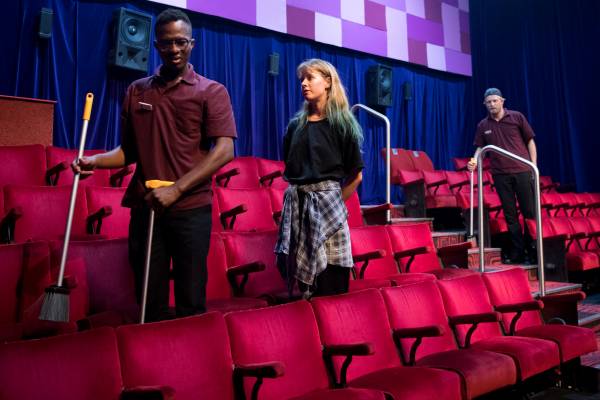Reginald Theatre, April 7
9/10
This is dangerous theatre. You feel it testing your responses, stamina, patience and involvement. It’s asking you to enter into a pact: if you accept that a play which could have lasted two hours is going to last for three, you will be rewarded with infinitely finer veins of meaning and the time to absorb them. It’s like music: you could speed up the tempos of Bach’s Mass in B Minor, but to no end other than getting out the door sooner.
Annie Baker’s play takes Beckett’s experiments with pauses and applies them to naturalism. How long, she asks, is a silence? At what point does silence cease to increase tension and start to diffuse it? If you have a play that, amid a deluge of thematic concerns, is partially about miscommunication and non-communication, what happens if we actually witness that, rather than the accelerated, theatrical, audience-friendly version?

To see The Flick in the same week as STC’s strong production of Lucy Kirkwood’s The Children is to realise that whereas Kirkwood writes juicy roles for good actors, Baker (her contemporary) writes transformative drama-comedy. This is a play that seeps in to your bones and haunts you thereafter, twisting, as it does, from a mania for cinema to unrequited love; from subtle racism to glacially slow-moving workplace politics of envy, gratitude and resentment.
A major work, it is intimate, tender, devastating, funny, infuriating and oh so finely observed, and, once again, the commendably consistent Outhouse Theatre has done Baker proud. Director Craig Baldwin has trusted his brilliant cast to make the sometimes aching pace work, and they have repaid that trust a hundredfold.
The Flick is set in a small Massachusetts cinema, where Sam (Jeremy Waters) and Rose (Mia Lethbridge) run the show on behalf of their absent, uninterested boss. They are joined by Avery (Justin Amankwah), an obsessional film buff, who mourns the approaching change from film to Blu-ray as a farmer might mourn climate-change. Sam has a thing for Rose, Rose has a thing for Avery, and Avery has a thing for cinema, and so what if they embezzle a little on the side? Does anyone seriously consider less than eight dollars an hour a living wage?
Hugh O’Connor’s set confronts the audience with something of a mirror image: a cinema’s banks of red-plush seats. Baldwin disburses the action, dialogue and silences around those seats (and the upstairs projection booth), sometimes like chess moves, and an unexpected upshot is that watching this becomes eerily cinematic. Depending on the actors’ positioning and Martin Kinnane’s lighting one has close-ups, long-shots, two-shots, cutaways, jump-cuts and blackouts.
Jeremy Waters again reminds us that he is among our supreme actors. He can be as vulnerable as he is potent, and, like Baker’s understated writing, his acting has no seams; just a broad fabric of absolute truth. Lethbridge is equally convincing as the ostensibly self-confident Rose, who doesn’t quite know what she wants. Her attempt to seduce Avery combines high comedy, frustration and a gulf of sadness. Amankah’s performance is simply the most impressive professional stage debut I recall. Some minor flaws – like lightly picking up a case that has just tested Sam’s strength – apart, he slides into the deep truth surrounding him and only enhances it. Finally Matthew Cheetham picks up the two minor roles with absolute aplomb.
I remain conflicted knowing that 30 minutes could so easily be cut, and yet I also know I’ve just seen a truly significant piece of theatre.